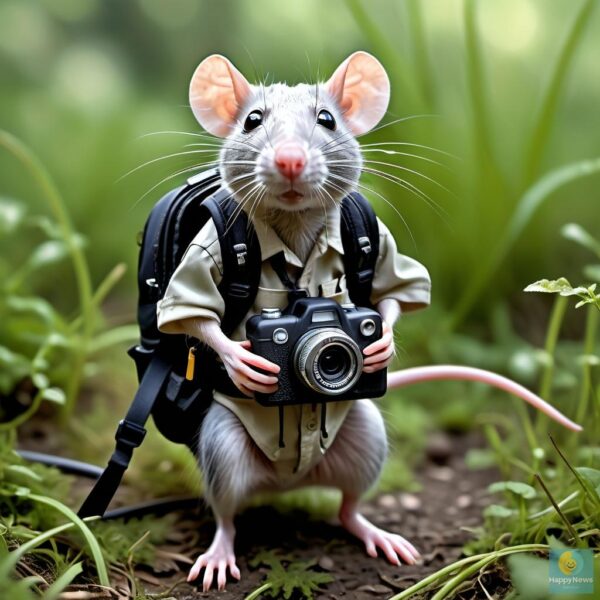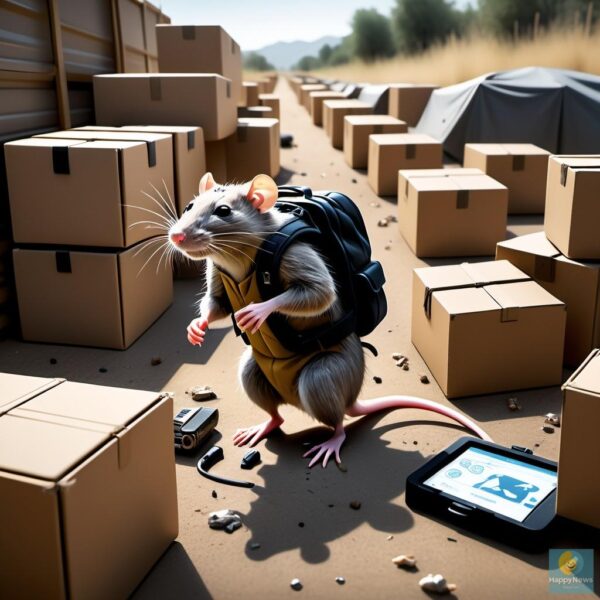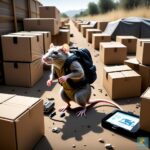- Tiny backpack-wearing rats are now playing a crucial role in identifying trafficked wildlife products, showcasing a remarkable new application for their keen sense of smell.
- The African giant pouched rats have been specifically trained to recognize the distinct scents of contraband animal parts, including prized elephant tusks and endangered rhino horns.
- Previously employed for detecting explosives and tuberculosis, recent scientific research demonstrates that these agile rodents can also excel at identifying illicit wildlife items.
- In a groundbreaking proof-of-concept study, sixteen trained rats successfully pinpointed various commonly trafficked wildlife products concealed within shipping containers in a controlled laboratory environment.
Background
Imagine a world where small, agile allies are employed to curb the illegal wildlife trade. In an unconventional twist, specially trained rats are now part of this mission, equipped with tiny backpacks, helping authorities track down wildlife smugglers trafficking endangered animal parts. These unlikely heroes, trained for precision and outfitted with the latest tracking technology, offer new hope in safeguarding vulnerable species and disrupting the thriving black market.

Firstly, the “Unlikely Guardians” – Why Rats?
Rats might seem an unexpected choice, yet their keen sense of smell and adaptability make them invaluable assets. Able to detect specific odors at trace levels, these rodents can identify hidden animal parts, alerting teams to smuggled goods. Additionally, rats are easy to train, inexpensive to maintain, and possess remarkable agility—traits that are critical for reaching concealed areas that might be inaccessible to traditional security equipment or even larger dogs. Refer a study on tasks for rats here.
This sensory prowess enables these little protectors to sniff out ivory, rhino horns, and pangolin scales, aiding in the crackdown on illegal trades. By focusing on scent-based cues, rats contribute to a field that traditionally relied on human operatives or sniffer dogs. Their smaller size and unobtrusive nature also mean they’re less likely to draw attention, allowing for discreet operations at high-risk checkpoints.
Secondly: Training Rats for Trafficking Detection
Training rats to detect animal parts demands precision and patience. These rodents undergo rigorous conditioning, associating specific scents linked to animal products with a reward. Positive reinforcement techniques encourage them to distinguish between scents, accurately pinpointing illegal items without causing damage.
Special backpacks are custom-fitted to these rats, housing small GPS units and cameras that transmit real-time data to monitoring stations. This equipment enables handlers to follow their movements and receive instant alerts when a rat identifies a suspicious object. The training process involves exposing the rats to samples under controlled conditions, rewarding them for successful identification, and gradually increasing the complexity of their tasks.

Next, The Technology Behind the Tiny Backpacks
The rats’ miniature backpacks are an innovation in themselves. These packs contain high-resolution cameras and lightweight GPS devices, enabling real-time tracking in various environments. With each step, the rats offer live feedback, allowing authorities to pinpoint smuggling operations or hidden caches of animal products quickly.
Built for durability and comfort, these backpacks allow for extensive fieldwork without hindering the rats’ movement. Designed with aerodynamics and resilience, they can withstand the conditions these rats face during searches, from bustling marketplaces to remote border zones.
Impacts on Global Anti-Trafficking Efforts
he introduction of rats in anti-trafficking missions marks a milestone in conservation efforts. With these rodents on patrol, authorities can tackle wildlife smuggling with enhanced effectiveness. In regions notorious for black-market activities, these furry sleuths offer a discreet and scalable solution, capable of adapting to different terrains and climates. Moreover, they alleviate the reliance on more costly and resource-intensive tracking methods, positioning themselves as an eco-friendly and financially viable alternative.
The data gathered through these missions aids international wildlife organizations in mapping smuggling routes and identifying hotspots. It also strengthens enforcement efforts, contributing to higher conviction rates and acting as a deterrent to poachers and traders.
Success Stories and Future Potential
Initial deployments of backpacked rats in pilot projects have yielded promising results. In regions where smuggling routes are deeply entrenched, these rodents have proven capable of detecting hidden contraband that evades traditional security checks. By disrupting supply chains, they play a crucial role in protecting endangered species, from elephants and rhinos to rare reptiles and birds.
Future expansions of this program could see larger fleets of rats deployed in airports, border crossings, and wildlife sanctuaries worldwide. With improvements in sensor technology, these rats might even detect chemical markers left by traffickers, adding another layer to their tracking abilities. Collaborations with animal welfare organizations ensure that the rats are well cared for, reinforcing the ethical standards of this initiative.

Conclusion
Rats with tiny backpacks are redefining anti-trafficking operations, blending biological instincts with modern technology to thwart wildlife smugglers. As they navigate remote and high-risk environments, these small yet mighty allies demonstrate that innovative conservation tactics can yield powerful results. Through continued development, this initiative may soon serve as a model for other regions facing wildlife crime, inspiring a new wave of resourceful, nature-based solutions in the fight to preserve Earth’s biodiversity.
Similar Posts:
- Whole Grain Wonders: Healthy Foods for You and the Planet
 Switching to a whole grain diet not only revitalizes your health but also contributes to a healthier planet by using fewer … Read more
Switching to a whole grain diet not only revitalizes your health but also contributes to a healthier planet by using fewer … Read more - Rats with Backpacks: The New Heroes Against Smuggling
 Background Imagine a world where small, agile allies are employed to curb the illegal wildlife trade. In an unconventional twist, specially … Read more
Background Imagine a world where small, agile allies are employed to curb the illegal wildlife trade. In an unconventional twist, specially … Read more - Reasearch based top 6 tips on raising “Good Kids”
 Introduction Every parent’s dream is to raise children who are kind, responsible, and emotionally resilient. Harvard psychologists have examined what it … Read more
Introduction Every parent’s dream is to raise children who are kind, responsible, and emotionally resilient. Harvard psychologists have examined what it … Read more - Empowering Children with Dyslexia in Chennai: MDA
 Introduction In 1992, a compassionate group of parents, educators, and philanthropists came together to create the Madras Dyslexia Association (MDA). Their … Read more
Introduction In 1992, a compassionate group of parents, educators, and philanthropists came together to create the Madras Dyslexia Association (MDA). Their … Read more




